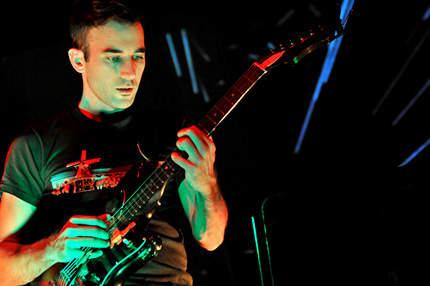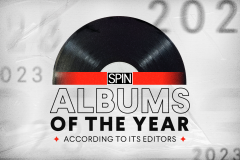When your most famous song is a self-critical elegy for a serial killer, there is no “business as usual.” And as Sufjan Stevens opened his tour in Montreal Tuesday night, business was extraterrestrial.
The indie-folk poet laureate of Brooklyn brought his lavishly melodic voice, an 11-piece band with three horns, two drummers, two keyboards, and two backup singers in Ace Frehleyette outfits, and an utterly uncorked flair for the orchestral.
Is it a weakness as well? Five years after Come On Feel the Illinoise blew up, he was in a packed Metropolis before a rapt and rapturous crowd, with his “Merci beaucoups,” his humble mien, and his outsized ambition. After 13-minute opener All Delighted People dropped in its Simon & Garfunkel brushstrokes, Stevens was announcing that new album The Age of Adz had been released this very day. “Let’s consider this a birthday party,” he said, promising “songs about love and death and the apocalypse.”
The intergalactic shuffle of “Too Much” proved those were no idle words. Stevens was going for baroque, presenting something more expansive and disjointed than the concepts of yore. The orch-prog bluster and spacey fillips of The Age of Adz meant this would be his electro-folkiest work, florid in aspiration and execution, a trip to the inner-outer cosmos depicted on the starry videoscreen.
The crowd followed every dramatic lurch and stutter-step, through the steam-engine rhythms of “I Walked,” with its unpleasant keyboards, into the art-pop of “Now That I’m Older.” They welcomed the punchy choral polyphony of “Vesuvius” and the Martian café sound of “Futile Devices”. But for all the colour and dynamic, there was something less than compelling to these outer limits. A paradox: a kind of overly-controlled excess. With talent to burn, Stevens still seemed like a brilliant kid in a toybox overstuffed with ideas, connecting them like Lego, requiring more consistent oomph and cohesion to unleash them. And then he launched his real Skylab.
“We’re about to embark on the magnum opus of love songs,” he said, advising fans to send whatever texts or check whatever emails they had to check before the half-hour plus “Impossible Soul” worked through its suite of staccato skronk and spare dance moves.It was massive, from trombones to electroblips to backup gals dancing in hotpants to Stevens busting out a vocoder. And yet it moved to some internal drama, a kind of anti-groove that left one wondering where we were going.
We were going where we had been, at points, in the show. After every 20 minutes or so of the new music, Stevens had pared things down to the literate and aching arpeggios of more familiar songs. In “Heirloom”, he was the breathy healer, in “Enchanting Ghost”, the voice whisperingly reaching for transport.
And after the magnum opus, there was the brilliant reward of Chicago, a perfectly moving ode to regret and freedom. What do you do for an encore? You deliver the last rites. In John Wayne Gacy Jr., with that unforgettable Oh my Gaw-ee-aw-ee-aw-ee-awd vocal, he was back on wrenchingly familiar tragic terrain. We were back in the crawlspace. We were home.





